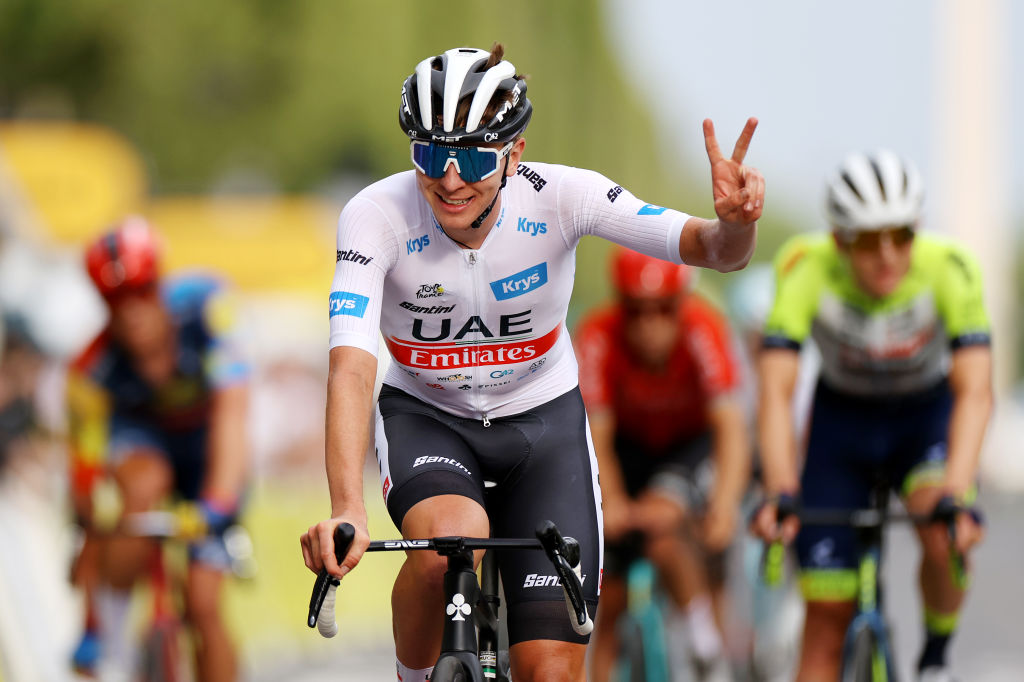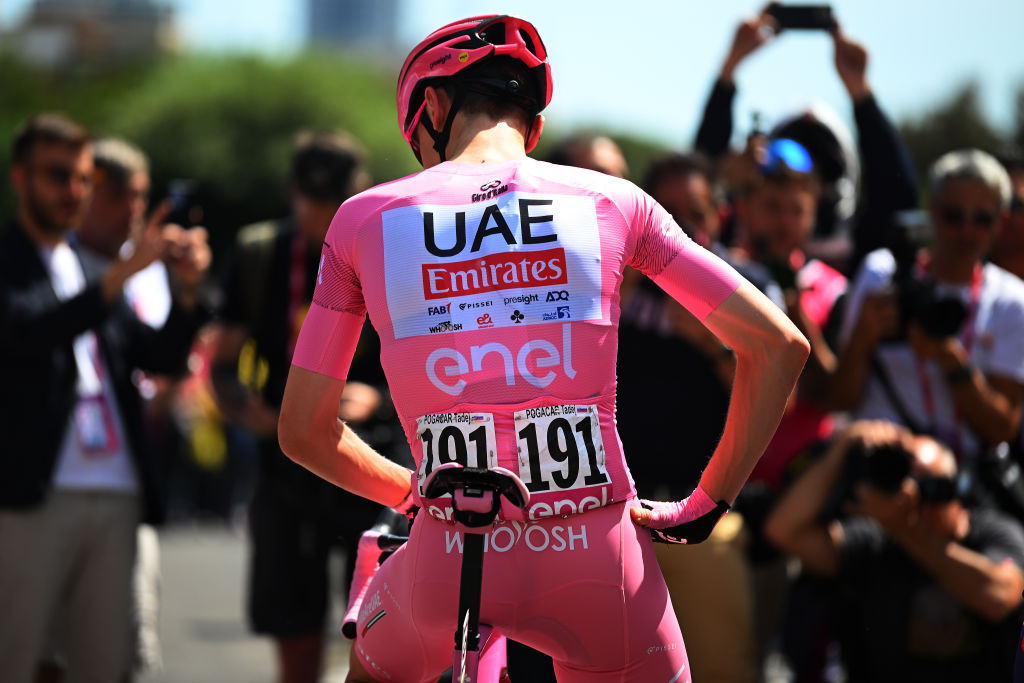‘We wanted Tadej to win, but with no exaggeration’ – The next steps in Pogačar’s Giro-Tour double plan
Rest, Isola altitude camp and no racing for Slovenian in five-week countdown to Grand Départ

No plan survives first contact with the enemy, so the saying goes, but Tadej Pogačar didn’t face a rival capable of knocking him even slightly off track at the Giro d’Italia. The scheme drawn up by his entourage to tackle the Giro and Tour de France remains firmly in place after his emphatic victory in Italy.
No rider has achieved the Giro-Tour double since Marco Pantani in 1998. The few to have seriously attempted the feat in the years since, notably Ivan Basso, Alberto Contador and Chris Froome, all came up short in July after dipping too deep into their reservoirs in May.
When UAE Team Emirates made the decision last winter to dispatch Pogačar to both the Giro and Tour in 2024, they immediately realised that coming through the Italian race without expending too much of his resources was key to the entire operation. The (relatively) lighter Giro route helped, of course, as did the absence of another rider of Pogačar’s exalted level to the start in Turin, but a Grand Tour usually throws up all sorts of additional ordeals for the winner.
In 2015, for instance, Contador suffered a heavy crash in the first week and then had to repel Astana’s almost daily onslaught. Pogačar, however, enjoyed an apparently stress-free race. His only fall, at Oropa on stage 2, was without consequence, he was never even remotely troubled by rival teams, and, for the first two weeks at least, the weather was mild. His Giro could scarcely have gone more smoothly, in other words.
“It’s been above my most optimistic expectations,” UAE Team Emirates sports manager Matxin Joxean Fernandez told Cyclingnews.
“Having a Giro with 11,000 metres’ less climbing than last year was already a fundamental part of the plan, and it’s gone well here too. In other years, there’s been more rain, but this time, it came mostly in the third week of the race. By that point, even if you have dangerous roads, there’s always less tension in the peloton anyway.”
It is an utterly absurd thing to say of a rider who won six stages and claimed overall victory by almost ten minutes, but UAE Team Emirates also succeeded in persuading Pogačar to race the Giro with relative restraint, at least by his otherworldly standards. Initially, it wasn’t clear if he would heed the advice when he attacked on each of the first three stages, but as the Giro drew on, Pogačar limited himself – in a manner of speaking – to striking out at precise moments in set-piece stages.
“When we made the plan for the Giro, we obviously had to have an eye to the Tour too, even if we had to have full concentration on this race from the moment it started, out of respect for our rivals and for the sport,” Matxin said.
The latest race content, interviews, features, reviews and expert buying guides, direct to your inbox!
“We wanted Tadej to win as well as he could, but with no exaggeration, no attacking from distance, always keeping one eye on the Tour de France. With that in mind, we had a team to help bring him close to the finish – he couldn’t go and race every day like he did at Strade Bianche, attacking with 80km to go, for three weeks straight.”
A custom calendar
Matxin confirmed that the Giro hasn’t changed Pogačar’s pre-established schedule for the build-up to the Tour. After some final media duties on Monday morning, Pogačar was due to travel home to Monaco for a week of rest. On Monday, June 3, he will report for duty at Isola 2000 in the French Alps for a shade under three weeks of altitude training, before a period of tapering before the Grand Départ in Florence.
“First up, he’ll have seven days of total rest, and then he’ll go to altitude next Monday, to Isola 2000, for exactly 19 days,” Matxin said. “There are five weeks between the Giro and Tour this year, and that’s important, because it allows time both to recover and to train before the Tour. We realised Tadej would need a week of rest and then a minimum of three weeks of training before the Tour, as well as some time at home before the race begins.”
In 2015, Contador surprisingly opted to add the Route du Sud to his schedule between the Giro and Tour. Although he beat Nairo Quintana there, he was off the pace in July, placing fifth overall in Paris. In 2018, the World Cup meant there was a six-week gap between the Giro and Tour, but Froome elected not to race at all between the two events. Dumoulin, second in both races that year, lined out at the Dutch Championships.
“We did study other double attempts, but it’s also clear that the circumstances were totally different,” said Matxin, who dismissed the idea that Pogačar might add the Slovenian Championships to his schedule ahead of the Tour. His race days have been deliberately and carefully rationed since the start of the year with the Tour in mind.
“He’ll go to the Tour with 31 days of racing in his legs, which has always been our plan. Our idea was to limit Tadej’s racing before the Giro, so he came in here with ten days of competition, and we’ve added 21 days more here. Some of his rivals for the Tour will have something similar in their legs.”
As things stand, Pogačar will be flanked by a completely different team at the Tour, with none of his supporting cast from the Giro – including Rafal Majka – doubling up in July. Instead, it is envisaged that Pogačar will have the support of Adam Yates, João Almeida, Juan Ayuso, Marc Soler, Pavel Sivakov, Nils Politt and Tim Wellens.
“We never considered having other riders on the team do the Giro and Tour, only Tadej,” Matxin said. “That’s because Tadej is special. He has immense quality, and he also has great powers of recovery.
“We weren’t going to ask the same thing of the other riders. The guys on the Giro can focus on the Giro, and the guys on the Tour can focus on the Tour. This is a custom calendar for Tadej, and it’s a custom preparation for Tadej too.”
At times, and despite Matxin’s protestations to the contrary, the Giro descended into something like a training exercise for Pogačar. Given his already insurmountable lead, his attacks in the third week looked a lot like public workouts in preparation for the Tour, where the level of opposition will be altogether higher. Remco Evenepoel (Soudal-QuickStep), Primož Roglič (Bora-Hansgrohe) and, fitness allowing, two-time winner Jonas Vingegaard (Visma-Lease A Bike) all stand between him and the yellow jersey in Paris.
During the Giro’s third week, Visma-Lease a Bike manager Richard Plugge downplayed Pogačar’s dominance here, telling Cyclingnews that his true level would be impossible to gauge until the white heat of July. Matxin nodded when Plugge’s statement was put to him. The second leg of the double will be a stiffer test.
“I’m absolutely in agreement with him, because in cycling today, you have a Big Six of riders – Vingegaard, Roglič, Tadej and Evenepoel, as well as Van der Poel and Van Aert – who are on another level. So in this Giro, you saw that there is a big difference between a race when they’re present and when they’re not. Tadej is very strong and in great condition, but at the Tour de France, it will be a different kind of competition to the Giro.”


Barry Ryan was Head of Features at Cyclingnews. He has covered professional cycling since 2010, reporting from the Tour de France, Giro d’Italia and events from Argentina to Japan. His writing has appeared in The Independent, Procycling and Cycling Plus. He is the author of The Ascent: Sean Kelly, Stephen Roche and the Rise of Irish Cycling’s Golden Generation, published by Gill Books.